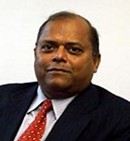Plenary Lecture
An Integrated Model of Global Warming and Policy Making

Professor Ramesh K. Agarwal
Department of Mechanical Engineering and Materials Science
Washington University in St. Louis
1 Brookings Drive, Box 1185, St. Louis, MO 63130, USA
E-mail: rka@wustl.edu
Abstract: This paper will describe a simple integrated model of global warming due to anthropogenic CO2 emissions that can used by the policy makers when considering various CO2 reduction trajectories for future years in order to meet the desired goals of acceptable increase in global average surface temperature in say years 2030 and 2050. The integrated model consists of three modules: (a) CO2 emission and concentration calculation module, (b) Global average surface temperature calculation module, and (c) CO2 reduction trajectory module. In the mathematical model, it is assumed that the emission and concentration of CO2, as well as the average global surface temperature are functions of time. A mathematical relationship is established among the CO2 emissions, CO2 concentration and global temperature as a function of time. This relationship is then used to determine the scenarios for policy makers under which the emissions (and hence the global warming) can be reduced to meet some targets by 2030 and 2050 as well the consequences of “Business as Usual” scenario. For this purpose, the two scenarios are considered: (a) Forward-step policy making scenario wherein a certain policy could be made based on the projection of CO2 emission growth and examining the consequence of employing certain mitigation approaches using the alternative solutions based on renewable energy, carbon sequestration etc. Then, the corresponding temperature increase in average surface temperature of the earth could be calculated and (b) Backward-step policy making scenario wherein an upper limit on the global average surface temperature increase is set and then various CO2 reduction trajectories over the desired time period are examined to achieve the goal of upper limit on the global surface temperature. The most promising CO2 reduction trajectory can then be used to consider various mitigation approaches which are both technologically and economically viable.
Brief Biography of the Speaker: Professor Ramesh Agarwal is the William Palm Professor of Engineering and the director of Aerospace Engineering Program and Aerospace Research and Education Center at Washington University in St. Louis. From 1994 to 2001, he was the Sam Bloomfield Distinguished Professor and Executive Director of the National Institute for Aviation Research at Wichita State University in Kansas. From 1978 to 1994, he worked in various scientific and managerial positions at McDonnell Douglas Research Laboratories in St. Louis. He became the Program Director and McDonnell Douglas Fellow in 1990. Dr. Agarwal received Ph.D in Aeronautical Sciences from Stanford University in 1975, M.S. in Aeronautical Engineering from the University of Minnesota in 1969 and B.S. in Mechanical Engineering from Indian Institute of Technology, Kharagpur, India in 1968. Over a period of 35 years, Professor Agarwal has worked in Computational Fluid Dynamics (CFD), nanotechnology and renewable energy systems. He is the author and coauthor of over 300 publications and serves on the editorial board of fifteen journals. He has given many plenary, keynote and invited lectures at various national and international conferences worldwide. Professor Agarwal continues to serve on many professional, government, and industrial advisory committees. Dr. Agarwal is a Fellow of fifteen societies - American Association for Advancement of Science (AAAS), American Institute of Aeronautics and Astronautics (AIAA), American Physical Society (APS), American Society of Mechanical Engineers (ASME), Royal Aeronautical Society (RAeS), Society of Manufacturing Engineers (SME), Society of Automotive Engineers (SAE), Institute of Electrical and Electronics Engineers (IEEE), American Society of Engineering Education (ASEE), American Academy of Mechanics (AAM), Institute of Physics, Energy Institute, Institute of Engineering and Technology, Academy of Science of St. Louis, and World Innovation Foundation (WIF). He has served as a distinguished lecturer of AIAA (1996-1999), ASME (1994-1997), IEEE (1994-2011), and ACM (2011). He has received many honors and awards for his research contributions including the ASME Fluids Engineering Award (2001), ASME Charles Russ Richards Memorial Award (2006), Royal Aeronautical Society Gold Award (2007), AIAA Aerodynamics Award (2008), AIAA/SAE William Littlewood Lecture Award (2009), James B. Eads Award of the Academy of Science of St. Louis (2009), SAE Clarence Kelly Johnson Award (2010), SAE Franklin W. Kolk Progress in Air Transportation Award (2010), ASME Edwin Church Medal (2011), AIAA Thermophysics Award (2011) and SAE John Connors Environmental Award.